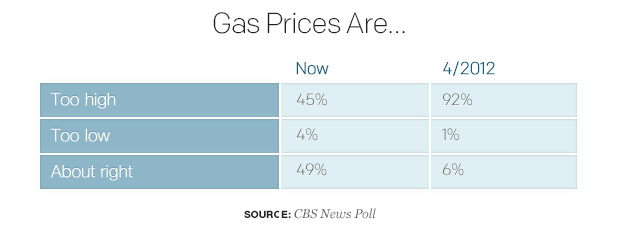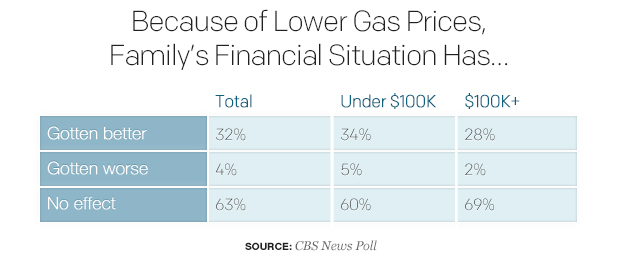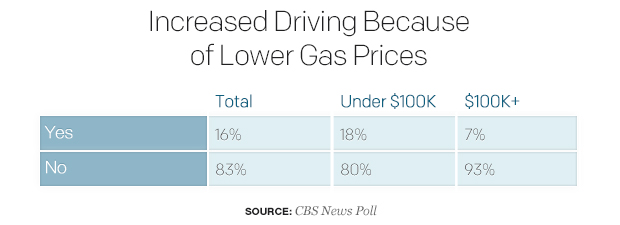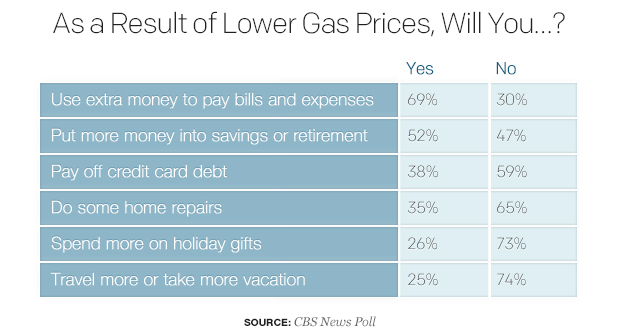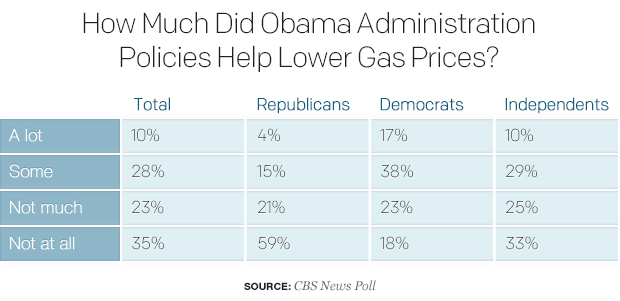Do Americans still think gas prices are too high?
Sarah Dutton, Jennifer De Pinto, Anthony Salvanto and Fred Backus
Despite a recent drop in the price of gas, 45 percent of Americans still think the price is too high - but that is far below the 92 percent who thought so in 2012. Forty-nine percent now think the price is about right, according to a new CBS News poll.
Sixty-three percent of Americans say lower gas prices have not had any effect on their financial situation, but for a third, the price drop has been beneficial. Majorities say they will use any savings from lower gas prices to pay bills or save; fewer will pay off credit cards, do home repairs, spend more on holiday gifts, or travel more.
Fifty-three percent of Americans don't think a president has much to do with the price of gas, and 58 percent think the Obama administration's policies contributed not much or not at all to the recent price drop.
The Price of Gasoline
With the price of gasoline now below $3 a gallon, far fewer Americans think the price of gas is too high than thought so two years ago. Now 45 percent of Americans think the price of gas is too high, while 49 percent of Americans think it is about right. In April 2012, when the average price of gas was just under $4 a gallon, 92 percent of Americans thought the price of gasoline was too high.
Most Americans earning over $100,000 a year think the price of gas is about right, while those earning less are divided.
There is little agreement about which direction gas prices are headed in the next few months. Thirty-nine percent of Americans think gas prices will go up, while 40 percent think they will go down. Another 19 percent think the price of gas will stay about the same.
Have Americans Been Affected?
Most Americans report that they have not noticed a financial benefit as result of lower gas prices - 63 percent of Americans say their family's financial situation has not been affected. But for a third, the drop in price has been beneficial; 32 percent say their finances have gotten better. Americans earning under $100,000 a year are slightly more likely to notice a difference than higher-income Americans.
Few have changed their driving habits as a result of lower gas prices. While 16 percent say they have driven more because of the drop, far more - 83 percent - say they have not. Americans earning under $100,000 a year are more likely to have changed their driving habits than higher income Americans.
Looking ahead, seven in 10 Americans say they plan to use what extra money they save from lower gas prices on paying bills and expenses, while 52 percent will put more money into savings or retirement. Less than half will pay off credit card debt (38 percent), do some home repairs (35 percent), spend more on holiday gifts (26 percent), or travel or take more vacation (25 percent).
Americans are now more skeptical that the president can have an impact on the price of gas. Most Americans - 53 percent - think the price of gas is beyond the control of the president, while 45 percent think the president can do something about it. In the past, Americans have been more inclined to say the president can affect the price of gas.
Republicans are the most likely to think the president can do something about the price of gas: 56 percent think he can. Most Democrats (60 percent) and independents (54 percent) think this is beyond a president's control.
Nevertheless, most Republicans don't think the current president's policies have anything do with the recent drop in the price of gas. Just 19 percent of Republicans think the Obama administration's policies had a lot or something to do with it, while 59 percent think the administration's policies had no effect at all. Among Americans overall, just 38 percent think the Obama administration's policies had at least something to do with the drop in prices, including 10 percent who think those policies had a lot to do with it.
----------------------------------------------------------------------------------------------------------------
This poll was conducted by telephone December 10-14, 2014 among 1,018 adults nationwide. The error due to sampling for results based on the entire sample could be plus or minus three percentage points. The error for subgroups may be higher.
Data collection was conducted on behalf of CBS News by SSRS of Media, PA. Phone numbers were dialed from samples of both standard land-line and cell phones. Interviews were conducted in English and Spanish. This poll release conforms to the Standards of Disclosure of the National Council on Public Polls.
